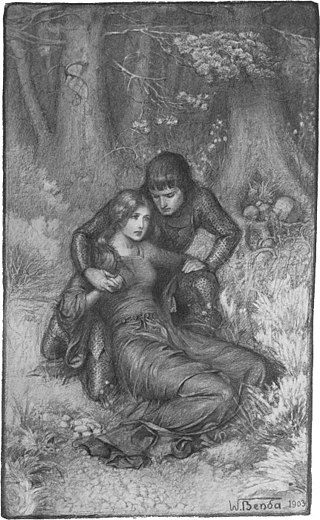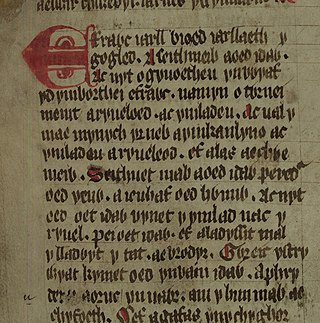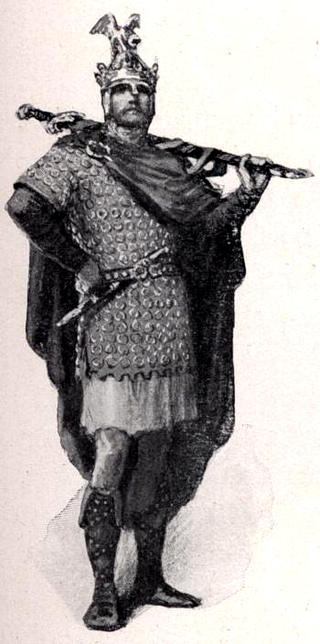Related Research Articles

Geoffrey of Monmouth was a Catholic cleric from Monmouth, Wales, and one of the major figures in the development of British historiography and the popularity of tales of King Arthur. He is best known for his chronicle The History of the Kings of Britain which was widely popular in its day, being translated into other languages from its original Latin. It was given historical credence well into the 16th century, but is now considered historically unreliable.

Uther Pendragon (Brittonic), also known as King Uther, was a legendary King of the Britons and father of King Arthur.

In the Matter of Britain, Igraine is the mother of King Arthur. Igraine is also known in Latin as Igerna, in Welsh as Eigr, in French as Ygraine, in Le Morte d'Arthur as Ygrayne—often modernised as Igraine or Igreine—and in Parzival as Arnive. She becomes the wife of Uther Pendragon, after the death of her first husband, Gorlois.

Beli Mawr was an ancestor figure in Middle Welsh literature and genealogies. He is the father of Cassivellaunus, Arianrhod, Lludd Llaw Eraint, Llefelys, and Afallach. In certain medieval genealogies, he is listed as the son or husband of Anna, cousin of Mary, mother of Jesus. According to the Welsh Triads, Beli and Dôn were the parents of Arianrhod, but the mother of Beli's other children—and the father of Dôn's other children—is not mentioned in the medieval Welsh literature. Several royal lines in medieval Wales traced their ancestry to Beli. The Mabinogi names Penarddun as a daughter of Beli Mawr, but the genealogy is confused; it is possible she was meant to be his sister rather than daughter.
Mempricius was a legendary king of the Britons, as recounted by Geoffrey of Monmouth. He came to power in 1060BC. He was the son of King Maddan, brother of Malin, and father of king Ebraucus.

Leir was a legendary king of the Britons whose story was recounted by Geoffrey of Monmouth in his pseudohistorical 12th-century History of the Kings of Britain. According to Geoffrey's genealogy of the British dynasty, Leir reigned around the 8th century BC, around the time of the founding of Rome. The story was modified and retold by William Shakespeare in his Jacobean tragedy King Lear.
Marganus was a legendary king of the Britons as accounted by Geoffrey of Monmouth. He came to power in 850BC.
Cunedagius was a legendary king of the Britons, as recounted by Geoffrey of Monmouth. He came to power in 850BC.
Rivallo was a legendary king of the Britons as accounted by Geoffrey of Monmouth. He came to power in 817BC.
The son of Gorbonianus was a legendary king of the Britons as recounted by Geoffrey of Monmouth. He was a son of King Gorbonianus but was never given a name in the text. He came to power in 305BC.
Enniaunus was a legendary king of the Britons as recounted by Geoffrey of Monmouth. He came to power in 293BC.
Runo was a legendary powerful king of the Britons as recounted by Geoffrey of Monmouth. He came to power in 281BC.

Historia regum Britanniae, originally called De gestis Britonum, is a fictitious historical account of British history, written around 1136 by Geoffrey of Monmouth. It chronicles the lives of the kings of the Britons over the course of two thousand years, beginning with the Trojans founding the British nation and continuing until the Anglo-Saxons assumed control of much of Britain around the 7th century. It is one of the central pieces of the Matter of Britain.

Peredur is the name of a number of men from the boundaries of history and legend in sub-Roman Britain. The Peredur who is most familiar to a modern audience is the character who made his entrance as a knight in the Arthurian world of Middle Welsh prose literature.
Aurelius Conanus or Aurelius Caninus was a Brittonic king in 6th-century sub-Roman Britain. The only certain historical record of him is in the writings of his contemporary Gildas, who excoriates him as a tyrant. He is also mentioned in William Winne's, The History of Wales (1697) p.7 as one of a succession of kings that fought against the Saxons. However, he may be identified with one of the several similarly named figures active in Britain during this period. In the 12th century Geoffrey of Monmouth adapted Gildas' account for his chronicle Historia Regum Britanniae, and thereafter Aurelius Conanus was remembered as a legendary King of Britain.
Cador is a legendary Duke of Cornwall, known chiefly through Geoffrey of Monmouth's pseudohistorical Historia Regum Britanniae and previous manuscript sources such as the Life of Carantoc. In Welsh genealogical records, he appears as Cado, the son of Cornish king Geraint. Early sources present him as a relative of King Arthur, though the details of their kinship are usually left unspecified.

King Hoel, also known as Sir Howel, Saint Hywel and Hywel the Great, was a late 5th- and early 6th-century member of the ruling dynasty of Cornouaille. He may have ruled Cornouaille jointly after the restoration of his father, Budic II of Brittany, but he seems to have predeceased his father and left his young son, Tewdwr, as Budic's heir.

Jago was a legendary king of the Britons according to Geoffrey of Monmouth. He was the nephew of Gurgustius, succeeded his cousin Sisillius I to the throne and was succeeded by Sissillius' son Kimarcus. Geoffrey has nothing more to say of him.

King Arthur's family grew throughout the centuries with King Arthur's legend. The earliest Welsh Arthurian tradition portrays Arthur as having an extensive family network, including his parents Uther Pendragon and Eigyr (Igraine), wife Gwenhwyfar (Guinevere), nephew Gwalchmei (Gawain), brother, and several sons; his maternal lineage is also detailed, linking him to relatives such as his grandfather. This complex familial structure has been both simplified and expanded in the common tradition of shared British, French, and other medieval European chronicles and romances, which instead introduced new characters, such as Arthur's half-sisters including Morgan, their children including Mordred, and others. Arthur's lineage was later claimed by various rulers, in particular the House of Tudor and Scottish clans, reflecting the enduring legacy of his familial ties in medieval and early modern genealogies.
Budic II, formerly known as Budick, was a king of Cornouaille in Brittany in the late 5th and early 6th centuries. He was father of Hoel as well as several Celtic saints.
References
- ↑ Monarchie Nobelesse website, Bretons
- ↑ Geoffrey of Monmouth (1987). The History of the Kings of Britain. Translated by Thorpe, Lewis. Penguin Books. p. 105. ISBN 9780140441703.